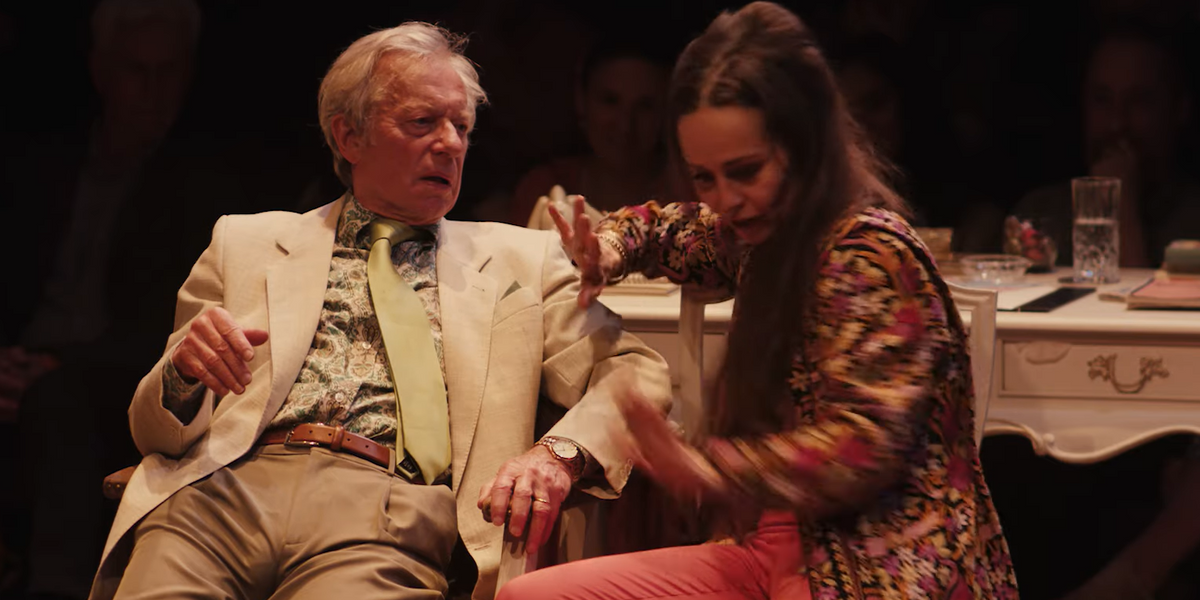Noël Coward is the king of choreography. Take his one-act play Still Life, perhaps better known as the screenplay Brief Encounter; it is meticulously crafted to reveal the push and pull between Alec and Laura, who continually mirror and reflect one another on stage. So much doubleness, so much pairing.
The same is entirely true for his play A Song at Twilight, originally written as part of a trio titled Suite in Three Keys, but beautifully performed as a standalone piece at the Orange Tree Theatre.
This is a production that gets to the heart of Coward’s drama which stunningly probes at the concept of identity.
In many ways, Tom Littler’s production speaks perfectly to our present moment: set too in a highly precarious moment for European politics, Coward explores the same sensitivities surrounding sex and gender that exist today.
In ill health, Hugo Latymer (Stephen Boxer) and his wife Hilde (Emma Fielding) live in a hotel on the banks of Lake Geneva when they are visited by Hugo’s old flame, Carlotta (Tara Fitzgerald).
Bringing with her letters that shed light on Hugo’s homosexuality, Carlotta effectively stirs up a glamorous storm, with frequently funny additions from butler Felix (Steffan Rizzi).
To fully explore the various relationships and the feelings bound up in them, Coward often relies on culinary metaphors to express the depth of human instinct.
This is expertly brought to life with the decadent three-course meal Hugo and Carlotta devour on stage.
Littler’s direction is wonderful here, as the meal becomes a focal point that swells and retracts in mood and atmosphere as the diners battle it out. This set piece foregrounds Coward’s forensic approach to emotion.
Alongside the preoccupation with appetite – both culinary and sexual – sits a focus on the zoological, as riffs on animal instinct and desire punctuate Coward’s script. A backdrop to these metaphors is the recent (A Song at Twilight is set in the 60s) terror of the Second World War and Hilde’s experience of Nazi Germany.
These elements crystallise excellently in a scene at the end of this production, when Hilde and Carlotta sit together, directly opposite a dejected, slumped Hugo, and talk about him as if he isn’t even present.
A literal dissection of his character and his life takes place before our very eyes, as Hilde and Carlotta’s sharp words cut Hugo open and lay him bare for all to see.
Coward’s clinical focus on how humans are coded and programmed jointly considers both Hugo’s sexuality and the horrifying historical backdrop where the genetic makeup of each individual was scrutinised for dreadful ends.
The Orange Tree as a theatre is indeed optimal for Coward’s play. The small square playing space, surrounded on all four sides by the audience, is admirably exploited to hone in on the interaction between public and private, something that preoccupies Hugo and his concern with reputation.
The audience, in such close proximity to the action, they are somewhat awkwardly positioned as onlookers to intensely intimate conversations, conversations that persistently modulate between English, French, German and Italian.
The inclusion of each of these languages at times alienates the audience, further extending that sense of secrecy, whilst also pointing to the political tensions that lie within different tongues at this moment in history.

Noel Coward’s work has been brought back to life at the Orange Tree Theatre
GETTY
For a play all about the potential threat of leaking letters, the four entry/exit points at each corner of the stage take on great significance; Carlotta regularly stumbles to one corner where sounds from the shores of Geneva seep in, illustrating that the confidential conversations happening in this small lounge cannot be completely disentangled from what is happening ‘out there’.
Other touches at The Orange Tree provided more brilliant food for thought: Hilde is dressed in blue while Carlotta dons pink. A stereotypical exploration of the sexes, perhaps, and how these different forces compete both for and within Hugo.
Tara Fitzgerald’s Carlotta truly sparkles – such a commanding, powerful performance was a joy to watch. Emma Fielding beautifully delivered the snippet of Heinrich Heine; Stephen Boxer is devastating at the play’s conclusion.
More than anything, though, this production serves as a superb reminder (if we ever needed it) of Coward’s excellence as a playwright and the need for more revivals of his stunning oeuvre.
A Song at Twilight plays until July 6 at Orange Tree Theatre. Buy tickets here – https://orangetreetheatre.co.uk/whats-on/suite-in-…










Post comments (0)